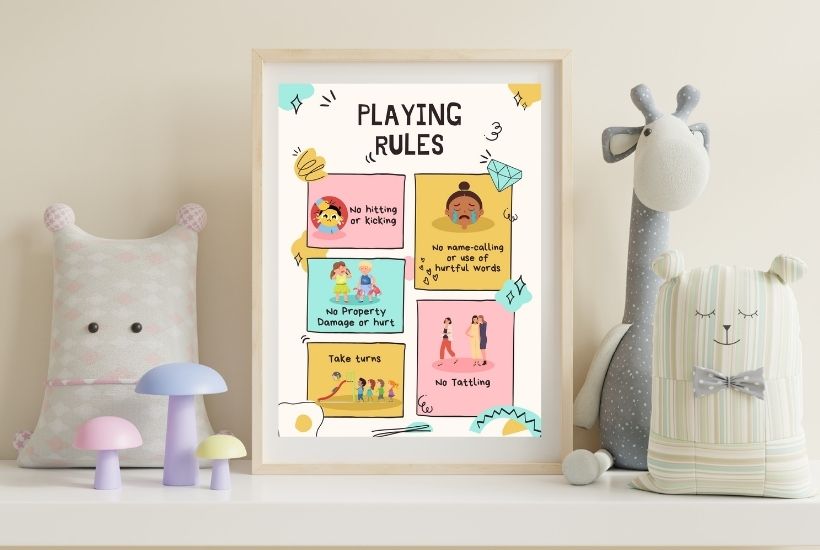How to Survive Sibling Rivalry: Tips for Coping
Sibling rivalry is a common issue that many parents face. Unfortunately, it can be tough to manage and often leaves parents feeling frustrated and exhausted. Fortunately, there are ways to cope with sibling rivalry and help your children get along. This blog post will discuss some tips for coping with sibling rivalry.
Remember that Sibling rivalry is normal. It’s a natural part of growing up, and it doesn’t mean there is something wrong with your children.
16 WAYS TO COPE WITH SIBLING RIVALRY
1# View each child as a unique person:
It’s important to remember that each of your children is an individual with their own needs and wants. Just because two children are siblings does not mean they are exactly alike. It’s important to view each child as an individual and give them the needed attention.
2# Pay attention to how you react to their conflicts, successes, and failures:
How you respond to your children’s successes and failures can play a significant role in how they interact with each other. If you praise one child for their accomplishments and ignore the other, it can foster jealousy and resentment. Try to be fair and give each child praise when deserved.
3# Strengthen the bond between siblings:
One way to help siblings get along is to encourage and strengthen their bond. This can be done by engaging in activities together, sharing meals, or simply spending time talking and listening to each other.
4# Encourage positive interactions:
It’s important to encourage positive interactions between siblings. This means praising good behavior, giving hugs and kisses, and discouraging negative behaviors like name-calling or fighting.
5# Set rules and Expectations:
Having rules and expectations can help siblings get along. Be clear about what is acceptable and what is not. This will help children know how to behave around each other.
6# Form Family Patterns that prevent sibling rivalry:
There are specific family patterns that can help prevent sibling rivalry. For example, having regular family meetings, engaging in activities together, or eating meals as a family can help siblings feel connected and reduce conflict.
7# Avoid Comparisons:
It’s important to avoid comparisons between siblings. This can foster feelings of jealousy and inferiority. Instead, focus on the individual strengths and talents of each child.
8# Provide Opportunities for Each Child to Shine:
Each child should have opportunities to shine. This can be done by giving each child a unique job, enrolling them in different activities, or simply allowing them to have some alone time.
9# Encourage Cooperation:
One way to reduce sibling rivalry is to encourage cooperation between siblings. This can be done by having them work together on projects, play games, or help each other with chores.
10# Don’t be dismissive:
It’s essential to take your children’s feelings seriously and not be dismissive. This means listening to their concerns, empathizing with them, and trying to see things from their perspective.
11# Don’t punish or yell in front of other siblings or others:
Yelling and punishment can only worsen the situation. It’s important to stay calm and constructively resolve conflict.
12# Create a Supportive Environment:
It’s essential to create a supportive environment in your home. This means having open communication, showing love and affection, and being there for each other.
13# Create Opportunities for One-on-One Time:
Make sure each child has some time alone with you. This will help them feel special and loved, and it will give them a chance to bond with you.
14# Teach Them How to Resolve Conflict:
Help your children learn how to resolve conflict constructively. This will teach them essential skills that they can use throughout their lives.
15# Look if you are contributing to their sibling rivalry:
Sometimes, the way you interact with your children can contribute to sibling rivalry. If you play favorites or compare them to each other, it can foster jealousy and resentment. Try to be fair and give each child the attention they need.
16# Be a role model:
One of the best things you can do is be a good role model. Show your children how to interact with each other positively. This means being respectful, listening to each other, and constructively resolving conflict.
WHAT IS SIBLING RIVALRY?
Sibling rivalry is jealousy, competition, and fighting between brothers and sisters. Parents face a common issue, and it can be tough to manage.

WHY DO SIBLINGS FIGHT?
There are many reasons why siblings may fight. It could be because they are hungry, tired, bored, need your attention, lack an affirmative feeling, are jealous of one another, or simply don’t know how to express themselves positively.
They fight because when their brain feels those feelings, it releases stress hormones that make a child feel like a fight, flight, or freeze reaction.
It’s a normal feeling and a normal reaction. We need to teach the skill to be mindful of their needs and how to deal with each need accordingly.
It’s important to remember that fighting is not always a bad thing. In fact, it can be a way for siblings to work out their differences and learn how to resolve conflict.
WHAT CAUSES SIBLING RIVALRY?
Sibling Rivalry is more than a fighting sibling. Sibling rivalry is a child’s feeling that they are not as good or as important as their sibling.
The feelings of jealousy start, and as the brain’s way of survival, The child starts defending himself just to tell the world that his brother or his sister is as bad as they feel and believe they are.
Many different factors can contribute to sibling rivalry. Some of the most common include:
Age difference: If siblings have a significant age difference, they may fight more often because they don’t have much in common.
Gender: Boys and girls tend to fight differently. Boys may physically fight more often, while girls may use words and gossip to hurt one another.
Personality: If siblings have different personality types, they may butt heads more often. For example, if one child is outgoing and the other is shy, they may not understand each other’s needs.
Parental favoritism: If parents show favoritism towards one child, it can cause the other child to feel jealous and lead to fighting.
Sibling roles: If one child is seen as the “good” child and the other is seen as the “bad” child, it can create tension between them.
Self Image: If a child has low self-esteem, they may be more likely to start fights with their siblings to feel better about themselves. When a child feels that they are not good enough or as important as their sibling.
FORMS OF SIBLING RIVALRY
There are many different forms of sibling rivalry. However, some of the most common conditions are:
Jealousy: This is when one child is jealous of the other. This can be because they feel like they are not as loved or appreciated as their sibling.
Competition: This is when children are always trying to outdo each other. They may compete for their parent’s attention or for grades in school.
Sibling bullying: This is when one child bullies the other. This can be physical, emotional, or verbal abuse.
Isolation: This is when one child tries to isolate the other. This can be done by excluding them from activities or talking badly about them to other people.
Aggression: This is when children get physical with each other. This can be hitting, kicking, or biting.
PARENTS’ CONCERNS ABOUT SIBLING RIVALRY
When children start to fight regularly, and when the parents can sense how jealousy affects their children, they start having their own fears. Some of the concerns that the parents have are that their children will:
- Never get along.
- Ruin their self Esteem
- Become bullies
- Resent each other
- Lack empathy
- Hurt each other emotionally or physically
- Become isolated
- Stop talking to each other.
- feel unloved and unappreciated
- always be in competition with one another
These fears are valid, and they should not be taken lightly.
If you notice that your children are displaying any of these behaviors, It is essential to talk to them and see what is happening. It is also crucial to take action if you feel like the situation is getting out of hand.
WHY DO PARENTS WORRY ABOUT SIBLING RIVALRY?
The main reason parents worry about sibling rivalry is that they want their children to get along. They want their children to resolve conflict constructively and have a good relationship with each other.
Another reason that parents worry about sibling rivalry is because they don’t want their children to hurt each other emotionally or physically. They also don’t want their children to become isolated or stop talking to each other.
Lastly, parents worry about sibling rivalry because they want their children to feel loved and appreciated. They don’t want their children to feel like they are always in competition with one another or that they are not crucial to the family.
HOW CAN SIBLING RIVALRY AFFECT A CHILD’S DEVELOPMENT?
Sibling rivalry can positively and negatively affect a child’s development. However, it is important to remember that not all sibling conflict is bad. It is only when the conflict starts to harm the child’s development that it becomes a problem.
Negative effects of sibling rivalry, if not handled, can include:
- Low self-esteem
- Anxiety
- Depression
- Aggression
- Isolation
- Poor coping skills
- Inability to resolve conflict
Positive effects of sibling conflicts can include a child’s learning:
- Empathy
- Cooperation
- Good problem-solving skills
- Flexibility
- Resilience
- Conflict resolution
- Standing up for themselves
- Negotiation Skills
- Compromise
- The ability to understand another person’s perspective.
HOW DO PARENTS NORMALLY REACT TO SIBLING RIVALRY?
Stop the fight:
The most common reaction that parents have to sibling rivalry is to try and stop the fighting.
They may do this by threatening punishment, separating the children, or trying to reason with them.
While these methods may work in the short term, they usually don’t solve the underlying problem and can make the situation worse in the long run.
Take Sides:
Another common reaction that parents have to sibling rivalry is to take sides.
They may try to favor one child over the other or make one child feel like they are responsible for the conflict.
This can also make the situation worse and damage the relationship between the parent and the child.

HOW SHOULD PARENTS START COPING WITH SIBLING RIVALRY?
1# Acknowledge their feelings and anger
The first step that parents should take when handling sibling rivalry is acknowledging their feelings. It is important to let the children know that it is okay to be angry with each other.
2# Listen to each child’s side of the story with respect.
The second step is to encourage them to talk about their feelings. This can be done by asking each child to tell their side of the story and listen to them with respect.
3# Empathize with each child
It is also important for parents to empathize with each child.
The third step is to show appreciation for the way they feel and the difficulty of the problem at hand.
This means that you should try to understand how each child feels and what they are going through.
You should also let each child know that you understand how they feel and are there for them.
4# Let them work it out.
The fourth step is to let the children work it out. This means that you should not try to solve the problem for them.
Instead, you should encourage them to find a solution that they are both happy with.
You can do this by expressing faith in their ability to find a fair and agreeable solution.
This doesn’t mean that you should ignore the fighting or let them hurt each other, but it does mean that you should allow them to resolve the conflict on their own.
If you try to stop the fighting or take sides, you will only make the situation worse.
5# Leave the room
The fifth and final step is to leave the room. This means that you should not try to mediate the conflict or take sides.
You should simply let them work it out on their own. If you try to help, you will only make things worse.
Parents need to encourage positive behaviors. This means that you should praise your child when behaving well and ignore the fighting.
If you do these things, you will help your children learn how to resolve conflict constructively, improving their relationship with each other.
So allow your child to feel the anger, hurt, fear, and resentment. Acknowledge those feeling to your child first, then talk about them.
This way, your child would not feel bad about themselves and would have the ability to have better feelings towards their siblings later.
Allowing bad feelings between siblings leads to feeling understood and accepted, thus bleeding to good feelings towards eachothers
WHEN SHOULD A PARENT INTERVENE WHEN SIBLINGS ARE FIGHTING?
If the children are physically hurting each other or using hurtful words, then the parent should step in and stop the fighting.
The parent should also intervene if the conflict prevents the children from doing something that they need to do, such as going to school or eating their dinner.
If the conflict is not severe and the children can resolve it independently, then the parent should let them work it out.
LEVELS OF SIBLING RIVALRY

Level 1: Normal Bickering
This is the most common level of sibling rivalry, and it is also the most harmless.
Normal bickering usually involves children who are close in age and competing for attention.
Parents need to understand that this type of fighting is normal and that it is not a sign that the children do not love each other.
In fact, bickering is often a sign of healthy sibling relationships.
Level two: Teasing and Name-Calling
Teasing and name-calling are more serious than normal bickering, but they are still relatively harmless.
This type of fighting usually occurs between children who are close in age and vying for attention.
Teasing and name-calling can become a problem if done in a hurtful or mean-spirited way.
If the teasing and name-calling are causing emotional pain, then the parent should intervene by following the five steps to handling sibling rivalry
- Acknowledge their feelings and anger
- Listen to each child’s side of the story with respect
- Empathize with each child
- Let them work it out
- Leave the room
Level three: Physical Aggression
Physical aggression is the most serious type of sibling rivalry. It usually occurs between children who are close in age and vying for attention.
Physical aggression can become a problem if done in a hurtful or mean-spirited way.
If the physical aggression is causing emotional pain, then the parent should intervene by following those steps:
- Describe what you see “I see two very frustrated children who are about to hurt each other”
- Separate the children. “It’s not safe to be together now. You must have a cooling-off period.”

SETTING RULES AND BOUNDARIES FOR SIBLING CONFLICTS
Parents need to set rules and boundaries for sibling conflicts. This means that you should establish acceptable behavior and what is not.
You should also clarify what to expect if the children break the rules.
Some things that you may want to include in your rules are:
- No hitting or kicking
- No name-calling or use of hurtful words
- No Property Damage or hurt
- What is the parent’s role
- Personal possessions
- Tattling
- Taking turns
These are just some examples, but you should tailor the rules to fit your family.
It is also important to enforce the rules consistently. This means that you should not allow the children to break the rules without talking to them and letting them know that you can not allow this behavior.

SKILLS CHILDREN NEED TO LEARN COPING WITH SIBLING RIVALRY
There are some skills that children need to learn coping with sibling rivalry. These skills will help them resolve conflicts on their own and avoid getting into fights with their siblings.
Some of the skills that children need to learn are:
- Listening
- Empathy
- Compromise
- Assertiveness
- Self-control
Parents can help their children learn these skills by teaching them how to use words to express their feelings, modeling appropriate behavior, and providing practice opportunities.
HOW TO ENCOURAGE A HEALTHY SIBLING RELATIONSHIP?
There are some things that parents can do to encourage a healthy sibling relationship.
Some of the things that you can do are:
- Encourage communication and cooperation
- Help them feel like a team
- Provide opportunities for practice
- Encourage positive reinforcement
- Provide opportunities for shared experiences
- Encourage empathy and compassion
- Set rules and boundaries
- Enforce the rules consistently
By doing these things, you can help your children develop a strong and healthy sibling relationship.
Final Takeaways
Sibling rivalry is a normal part of growing up. However, it can be a problem if done hurtfully or mean-spirited. If sibling rivalry is causing emotional pain, then the parent should intervene by following the steps outlined in this article.
Parents can also help their children learn the skills needed to start coping with sibling rivalry by teaching them how to use words to express their feelings, modeling appropriate behavior, and providing practice opportunities.
Finally, parents can encourage a healthy sibling relationship by doing things such as encouraging communication and cooperation, helping them feel like a team, and providing opportunities for shared experiences.
I hope that these tips will help you cope with sibling rivalry in your own family. If you have any questions or would like to share your own experiences, please comment on my Instagram account.
Thank you for reading!








One Comment
Comments are closed.